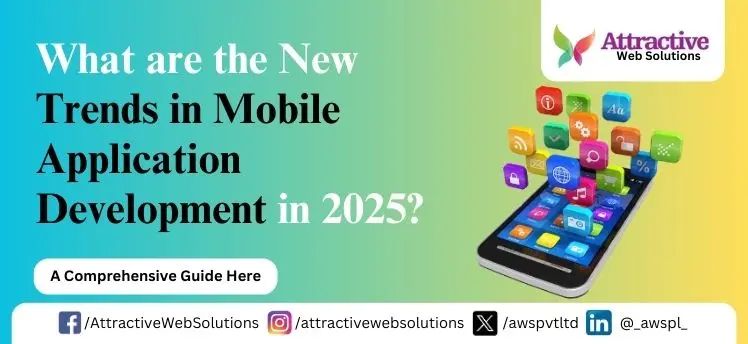The world of mobile application development is evolving rapidly, driven by advancements in technology and changing user expectations. As businesses and developers strive to create more efficient, engaging, and innovative applications, new trends are emerging that will shape the future of the industry. In 2025, several key trends will define how mobile apps are built, deployed, and experienced by users. In this blog, we will explore the latest trends in mobile application development and how they are transforming the digital landscape.
1. Advancing Mobile Apps with Artificial Intelligence (AI) and Machine Learning (ML)
AI and ML have already made significant contributions to mobile application development, but in 2025, their impact will be even more profound. From personalized user experiences to advanced chatbots and voice assistants, AI-powered applications are set to dominate the market.
Developers are leveraging AI to enhance app functionalities, such as predictive analytics, image recognition, and natural language processing. AI-driven automation is also helping businesses streamline operations and improve decision-making. As AI technology continues to advance, mobile applications will become smarter and more intuitive, offering users highly personalized experiences.
2. 5G-Powered Applications
The rollout of 5G technology is revolutionizing mobile application development by providing faster data speeds, lower latency, and improved connectivity. With 5G, mobile apps can deliver seamless experiences, including high-definition video streaming, real-time multiplayer gaming, and augmented reality (AR) applications.
As more users adopt 5G-enabled devices, developers will focus on creating apps that leverage this technology to enhance performance and user engagement. Businesses that capitalize on 5G capabilities will gain a competitive edge in delivering high-speed and efficient applications.
3. Progressive Web Apps (PWAs)
Progressive Web Apps (PWAs) are becoming increasingly popular as they combine the best features of websites and native apps. PWAs offer fast loading times, offline accessibility, and seamless user experiences without requiring installation from an app store.
In 2025, more businesses will adopt PWAs to reach a broader audience while reducing development costs. These applications are lightweight, consume less data, and provide an app-like experience on both desktop and mobile devices. Companies looking to improve user engagement and retention should consider investing in PWA development.
4. Augmented Reality (AR) and Virtual Reality (VR) Apps
AR and VR technologies are reshaping the way users interact with mobile applications. From gaming and entertainment to education and retail, AR and VR applications are providing immersive experiences like never before.
In 2025, industries such as real estate, healthcare, and e-commerce will increasingly integrate AR and VR to enhance customer interactions. Virtual try-on solutions, AR-powered navigation, and interactive learning applications will become more prevalent, offering users engaging and realistic experiences.
5. Blockchain Technology in Mobile Apps
Blockchain is not just for cryptocurrency anymore—it is transforming mobile application development by offering enhanced security, transparency, and decentralization. Businesses are leveraging blockchain for secure transactions, data protection, and supply chain management.
Mobile apps utilizing blockchain technology will gain popularity in finance, healthcare, and e-commerce sectors. Decentralized applications (dApps) are also expected to see significant growth, enabling peer-to-peer interactions without intermediaries.
6. Internet of Things (IoT)-Enabled Apps
The Internet of Things (IoT) is expanding its influence on mobile application development, allowing devices to connect and communicate seamlessly. IoT-enabled apps are being used in smart homes, healthcare monitoring, and industrial automation.
In 2025, businesses will continue to invest in IoT applications to enhance productivity, improve security, and provide real-time data insights. Mobile applications that integrate with IoT devices will offer users greater control over their connected ecosystems.
7. Cloud-Based Mobile Applications
Cloud computing is playing a crucial role in mobile application development by providing scalable, flexible, and cost-effective solutions. Cloud-based applications allow users to access data and services from anywhere, reducing dependency on device storage.
Businesses adopting cloud-powered apps will benefit from enhanced security, seamless updates, and improved collaboration. As remote work continues to rise, cloud-based applications will enable efficient workflows and data synchronization across multiple devices.
8. Super Apps – The Future of Multi-Purpose Applications
Super apps are gaining traction as they offer multiple services within a single platform. From messaging and payments to food delivery and ride-hailing, super apps provide users with a comprehensive digital experience.
In 2025, businesses will focus on developing super apps to increase customer retention and engagement. By integrating various services into one app, companies can create all-in-one solutions that cater to diverse user needs.
9. Voice Search and Voice-Activated Apps
Voice search is becoming a dominant trend in mobile application development as users increasingly prefer hands-free interactions. With the rise of smart assistants like Alexa, Google Assistant, and Siri, voice-activated apps are gaining popularity.
Developers are optimizing applications for voice search to improve accessibility and convenience. Businesses integrating voice-enabled features into their apps will enhance user experiences and expand their audience reach.
10. Enhanced App Security and Privacy Measures
As cyber threats continue to evolve, app security remains a top priority for developers. In 2025, mobile application development will emphasize robust security measures, including end-to-end encryption, biometric authentication, and AI-driven threat detection.
With growing concerns over data privacy, businesses must comply with regulations such as GDPR and CCPA to protect user information. Implementing advanced security protocols will build user trust and prevent cyberattacks.
Choosing the Best Mobile App Development Company in India
With the rapid evolution of mobile application development, businesses must partner with a reliable development company to stay ahead of the competition. The Best Mobile App Development Company in India offers cutting-edge solutions tailored to specific business needs.
When selecting a development partner, consider the following factors:
- Experience and expertise in mobile application development
- Proven track record of successful projects
- Proficiency in the latest technologies and trends
- Strong portfolio showcasing diverse app development capabilities
- Client testimonials and reviews
- Effective communication and project management
By collaborating with the Best Mobile App Development Company in India, businesses can leverage innovative technologies to create high-performing, user-friendly mobile applications.
Conclusion
The future of mobile application development is filled with exciting possibilities, driven by technological advancements and evolving user demands. From AI-powered experiences and 5G-enabled apps to blockchain security and IoT integration, the trends shaping 2025 will redefine how businesses engage with their customers.
Staying updated with these trends and adopting innovative solutions will help businesses gain a competitive edge in the digital marketplace. Whether you are a startup or an established enterprise, partnering with the Attractive Web Solutions will ensure your mobile application stands out in the ever-evolving tech landscape.
As we step into 2025, the world of mobile apps continues to evolve, promising new opportunities for businesses and developers alike. Are you ready to embrace the future of mobile application development?









0 Comments